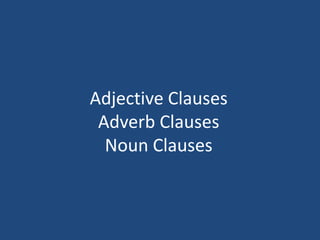
Grammar Clause Types Explained
- 1. Adjective Clauses Adverb Clauses Noun Clauses
- 2. What is a clause? A sentence with a subject and a verb that is part of a longer sentence
- 3. Adjective Clauses (Lesson 6)
- 4. Adjective Clauses 1) modify a noun 2) usually go after the noun they modify 3) usually begin with a relative pronoun
- 5. Examples of sentences with adjective clauses:
- 6. A have a friend who is a computer programmer.
- 7. Bill Gates, who is a rich person, created Microsoft.
- 8. Adverb Clauses = Adverbial Clause (Chapter 8)
- 9. An adverb clause 1) gives more information about the main clause 2) It can be the first half or the second half of a complex sentence 3) It begins with a subordinator = and adverbial expression
- 10. She went to Canada before she came to the U.S. Before she came to the U.S., she went to Canada
- 11. I came to the United States so that I could be reunited with my family.
- 12. If she saves enough money, she will travel to Europe.
- 13. Noun Clauses: 1) Replaces a noun in the sentence. 2) Can be anywhere in the sentence because a noun clause can replace the subject, the object, or the object of a preposition. 3) Usually begins with “that” or a question word (“what,” “when,” “where,” “why,” “who,” etc.)
- 14. Some words can be used in more than one kind of clause! For example, “when”:
- 15. An adjective clause: I was born in 1947, when World War 2 was recently finished.
- 16. An adverb clause: I lived in Orange County when I first got to the U.S.
- 17. An noun clause: I don’t know when Bill Gates was born.
